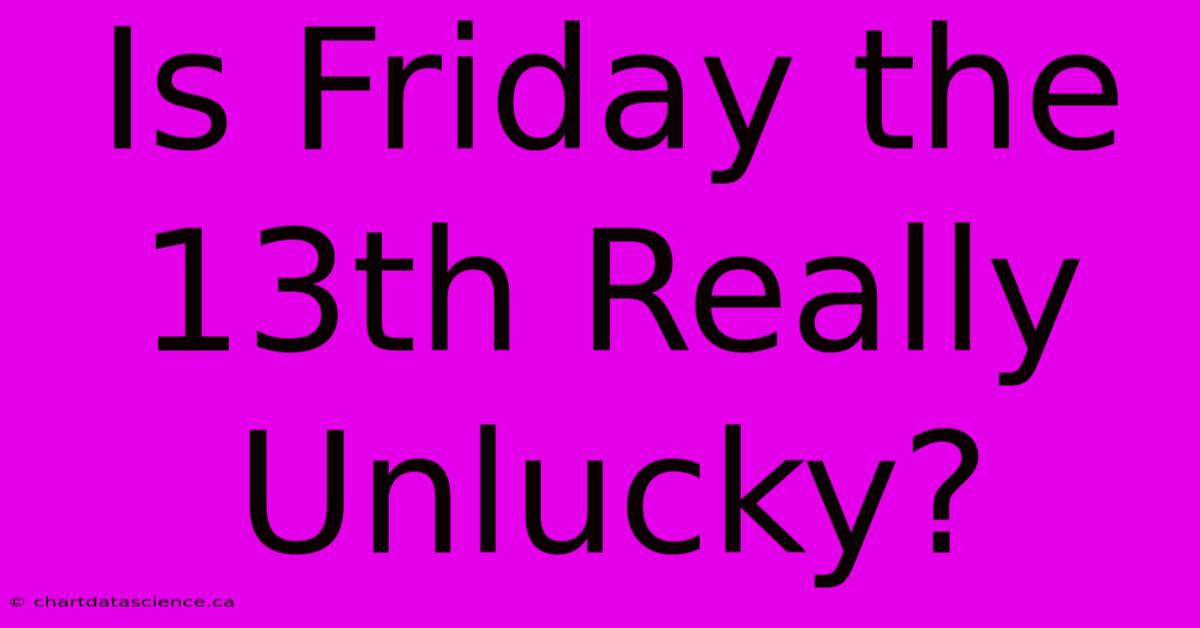Is Friday The 13th Really Unlucky?

Discover more detailed and exciting information on our website. Click the link below to start your adventure: Visit My Website. Don't miss out!
Table of Contents
Is Friday the 13th Really Unlucky? Debunking the Myth
Friday the 13th. The phrase conjures images of black cats, broken mirrors, and impending doom. But is there any real truth behind this widely held superstition? Let's delve into the history and psychology behind this fascinating cultural phenomenon and explore whether there's any basis for the fear.
The History of Friday the 13th
The association of Friday with misfortune has ancient roots. In Christianity, Friday is associated with the crucifixion of Jesus Christ. The number 13 has also long been considered unlucky, possibly stemming from the Last Supper, where 13 people were present before the betrayal of Judas. These historical and religious connections laid the groundwork for the modern superstition.
The "Friday the 13th" in Literature and Popular Culture
The association between Friday the 13th and misfortune truly took off in the 20th century, largely thanks to Thomas Lawson's 1907 novel, "Friday, the Thirteenth." This story solidified the link between the date and bad luck in the public consciousness. The popular Friday the 13th horror film franchise further cemented this association in modern culture, capitalizing on the pre-existing fear.
The Psychology of Superstition
Why do so many people believe in the bad luck associated with Friday the 13th, even if they consciously acknowledge it's a superstition? Psychology offers some interesting insights:
Confirmation Bias
People tend to remember instances that confirm their pre-existing beliefs. If someone believes Friday the 13th is unlucky, they're more likely to notice and remember any negative events that occur on that day, reinforcing their belief. Conversely, positive experiences on that date are often overlooked.
Cognitive Biases
Our brains are wired to search for patterns, even where none exist. The coincidence of a negative event happening on Friday the 13th can be interpreted as a causal link, even if it's purely random. This is a cognitive bias that reinforces the superstition.
The Power of Suggestion
The widespread belief in Friday the 13th creates a self-fulfilling prophecy. If many people believe something is unlucky, they might behave more cautiously or anxiously on that day, potentially leading to real-life consequences, thereby seeming to "confirm" the superstition.
Friday the 13th: Fact vs. Fiction
Despite the widespread belief, there's no statistical evidence to support the claim that Friday the 13th is any more unlucky than any other day. Studies have shown that accident rates and other negative events don't increase significantly on this day.
The Power of Belief:
The impact of Friday the 13th is largely psychological. The fear itself can cause stress and anxiety, potentially leading to poorer decision-making and increased risk-aversion. This, ironically, could lead to more minor accidents or misfortunes, confirming the belief in the superstition.
Conclusion: Embracing Rationality
While the history and cultural significance of Friday the 13th are undeniable, the underlying belief is purely superstition. Understanding the psychological mechanisms behind this fear can help us to approach the date with a more rational and less anxious perspective. So, the next time Friday the 13th rolls around, remember that it's just a day—a day that is no more or less likely to be filled with misfortune than any other. Embrace the day with a healthy dose of skepticism and enjoy the fact that it’s simply a day steeped in interesting cultural history.

Thank you for visiting our website wich cover about Is Friday The 13th Really Unlucky?. We hope the information provided has been useful to you. Feel free to contact us if you have any questions or need further assistance. See you next time and dont miss to bookmark.
Also read the following articles
| Article Title | Date |
|---|---|
| Pelosi Hospitalized After Congressional Trip Injury | Dec 14, 2024 |
| Cortes To Brewers Williams To Yankees | Dec 14, 2024 |
| The Cast Of Dexter Original Sin | Dec 14, 2024 |
| Friday 13th History And Superstitions Explained | Dec 14, 2024 |
| Dexter Original Sin Premiere Guide | Dec 14, 2024 |
